Common Puppy Emergencies and Specialty Cases

Very few things in life are as cute and lovable as a puppy. But yet, so fragile! Puppies, as with most young animals, tend to be very vulnerable to viruses and accidents as they build up their immune systems and explore their new surroundings. We love and adore puppies, but we don’t love to see them as sick or injured patients at our hospitals! Here are a few of the most common cases we see in puppies through our emergency and specialty services:
Case #1: The Sick Puppy
We commonly see puppies through emergency for upset stomachs, which usually means ongoing or waxing and waning diarrhea and an overall lethargic, unplayful puppy.
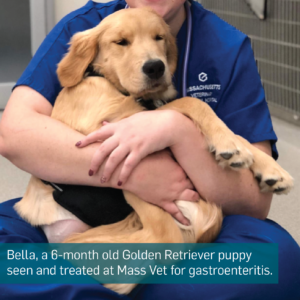
Symptoms: diarrhea, vomiting, lethargy, loss of appetite
Causes: many possibilities including new home anxiety, diet change, virus/bacteria, parasites (i.e. giardia), or a congenital condition
Treatment: supportive care, which usually includes IV fluids, anti-nausea medication, and other medications as needed
Case #2: The Parvo Puppy
Parvo is a highly contagious and potentially fatal virus that affects the intestinal tract of puppies.
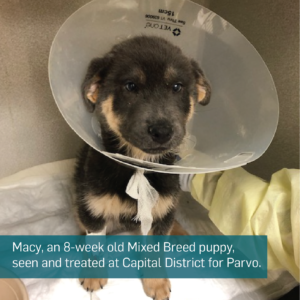
Symptoms: fever, vomiting, diarrhea, weakness, dehydration
Cause: transmitted through bodily secretions or direct contact with other infected dogs
Treatment: hospitalization on IV fluids, nutrition therapy, and medications & antibiotics as needed
Case #3: The Accident Puppy
Puppies are rambunctious and clumsy and can sometimes injure themselves, causing broken bones, fractures, or hernias.
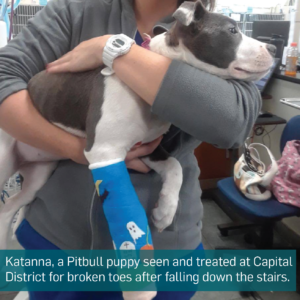
Symptoms: limping, whining/crying, signs of pain, lumps and bumps
Cause: jumping from high surfaces, falling down stairs, playing too rough, being stepped on, the possibilities are endless!
Treatment: depending on the severity of the injury, may require surgery, casting, wound care, or other forms of treatment
Case #4: The Coughing Puppy
Kennel cough is a highly contagious respiratory disease affecting puppies and dogs of any age.
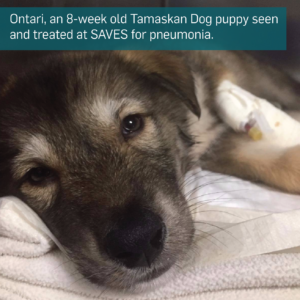
Symptoms: begins with lethargy, decreased appetite, and fever and then progresses to a deep, often productive, cough. If untreated, it can lead to pneumonia.
Cause: since it’s airborne, it often spreads in social settings (dog parks, boarding kennels, play groups, etc.)
Treatment: treated with antibiotics and supportive care
Case #5: The Puppy Who Ate Something
Most puppies will get into anything and everything they can get their paws on. We see many cases of puppies who present sick, and have actually eaten something they shouldn’t have.
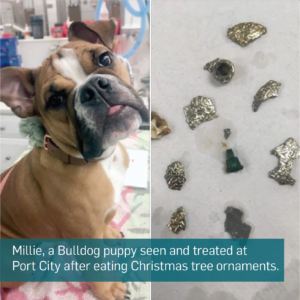
Symptoms: vomiting, diarrhea, lethargy, abdominal pain
Cause: eating some kind of foreign body, whether it be food or an object
Treatment: after detected via x-ray/ultrasound, may need surgical or endoscopic removal. May induce vomiting if it is a toxic food. Also treat with supportive care
Case #6: The Specialty Puppy
Some puppies, especially purebreds, may be born with or develop a condition inherent with their breed such as a heart condition, eye condition, or neurologic condition. A primary care veterinarian will often refer the puppy to one of our specialists for further diagnosis and treatment.
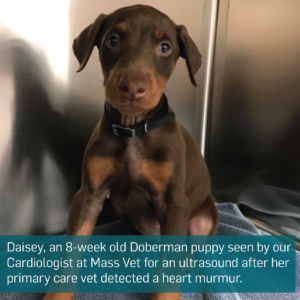
Symptoms: varying, usually detected by family veterinarian and referred to one of our hospitals
Cause: congenital or developed as puppy grows
Treatment: varying, specialist will work collaboratively with primary care vet in treating or managing condition
How do I keep my puppy healthy?
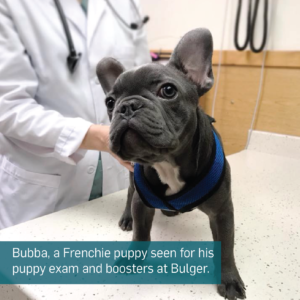 Regular visits with your puppy’s primary care veterinarian can help keep your puppy happy and healthy! They will need multiple vaccination boosters, de-wormers, and exams to ensure they are healthy and protected. At home, be sure to keep your puppy away from potential dangers (rough play or things they can chew/eat) and avoid contact with other dogs until they are fully vaccinated. Keep an eye on them, avoid any major life changes or stressors while they adjust, and have fun! Puppyhood won’t last forever, so enjoy it! We hope you won’t need our services for your puppy, but if you do we are here.
Regular visits with your puppy’s primary care veterinarian can help keep your puppy happy and healthy! They will need multiple vaccination boosters, de-wormers, and exams to ensure they are healthy and protected. At home, be sure to keep your puppy away from potential dangers (rough play or things they can chew/eat) and avoid contact with other dogs until they are fully vaccinated. Keep an eye on them, avoid any major life changes or stressors while they adjust, and have fun! Puppyhood won’t last forever, so enjoy it! We hope you won’t need our services for your puppy, but if you do we are here.
Written by RACHAEL GILLIS